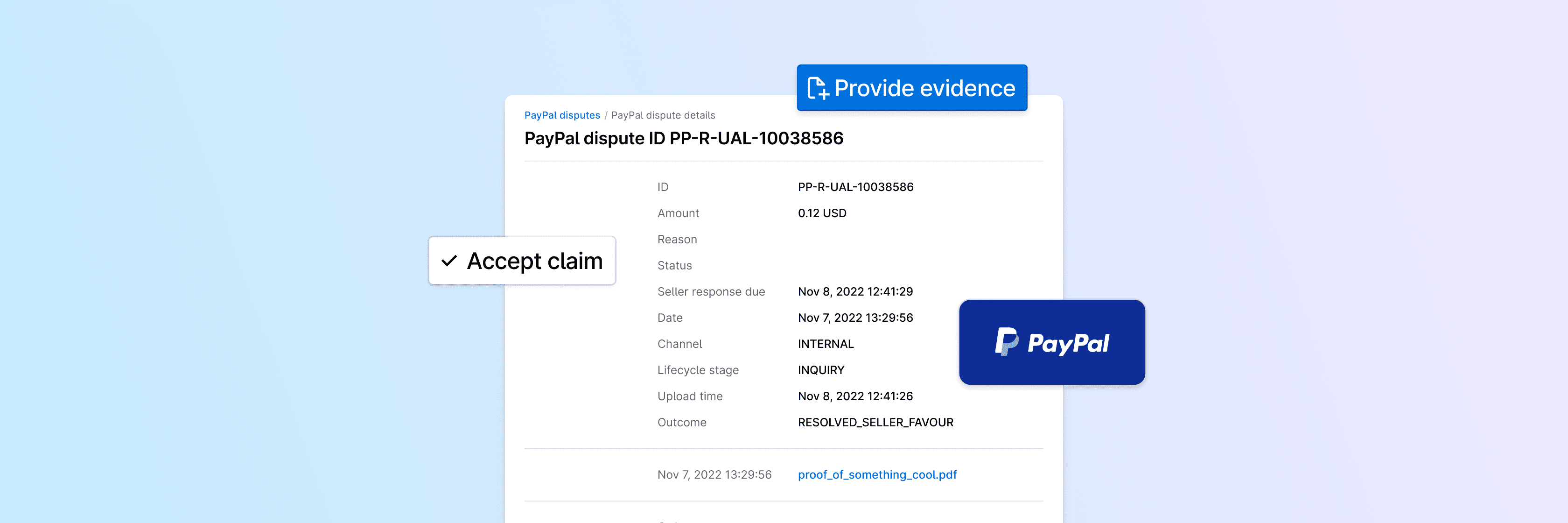Dealing with chargeback representment across providers means learning to work with different dispute process playbooks. To increase the chances of winning a dispute and reversing a chargeback, you always need to play by the provider’s rules.
When it comes to PayPal chargeback representment, how does PayPal decide who wins a dispute? One thing is known for sure: PayPal’s rigorous chargeback system likes to side with customers in disputes. To turn the odds in your favor, you need a well-structured and tailored approach that includes thorough evidence and detailed responses.
At Solidgate, we’ve created an automated AI-powered dispute representment system that streamlines this process for our merchants, increasing their dispute win rate. Drawing from years of experience in helping online merchants prevent and manage chargebacks, we’ve crafted a practical step-by-step guide on how to win PayPal disputes and protect your revenue.
Table of Contents
Determine the PayPal dispute type
Determining the dispute type is key, as your response should address the specific claim. According to PayPal’s dispute policy, PayPal disputes can arise for various reasons:
- MERCHANDISE_OR_SERVICE_NOT_RECEIVED: The buyer claims they didn’t receive access to the product or service.
- MERCHANDISE_OR_SERVICE_NOT_AS_DESCRIBED: The buyer claims the product or service differs from what was advertised, is defective, or lacks functionality.
- UNAUTHORIZED: The buyer claims they didn’t authorize the transaction.
- CREDIT_NOT_PROCESSED: The buyer claims they were expecting a refund or credit that hasn’t been issued.
- DUPLICATE_TRANSACTION: The buyer claims that two or more payments were processed for a single order and requests a refund for the extra charge.
- INCORRECT_AMOUNT: The buyer claims they were charged an amount different from what they expected.
- PAYMENT_BY_OTHER_MEANS: The buyer claims they already paid by another method (e.g., bank transfer, credit card, or cash) but were still charged through PayPal.
- CANCELED_RECURRING_BILLING: The buyer claims they were charged for a recurring subscription after canceling it.
Gather documentation
For PayPal disputes involving products and services sold online, demonstrating delivery and fulfillment is essential, so you must provide sufficient evidence to support your case.
After identifying the dispute reason, gather the following documentation:
Proof of Delivery/Access to the Service
Provide records showing the buyer successfully accessed, downloaded, or used the product or service. This can include timestamps, download logs, access logs, or other verification that confirms receipt.
Transaction Details
Include a clear record of the transaction, such as the invoice or receipt showing the product or service purchased, the amount charged, and the payment date. Ensure this matches the buyer’s claim.
Product Description
Present the original description of the product or service as listed at the time of sale to confirm that the product provided matches what was advertised.
Terms of Service and Refund Policy
Include a link to your “Terms and Conditions” and “Refund/Return Policy” that the buyer agreed to at purchase. This is especially helpful if these terms specify non-refundable conditions or if the buyer didn’t follow the correct process.
Communication History
Provide any emails or message exchanges with the buyer that confirm receipt, use, or agreement to the terms of the product or service. Include any attempts to resolve the issue before the dispute was opened, as well as documentation of support interactions regarding issues with the product or service.
Screenshots or Logs of Use
Include evidence that the product or service was used, such as system logs, API access logs, or other verification indicating interaction with the product.
Attach Screenshots
Add screenshots for each piece of evidence; links may not be accepted as proof. Screenshots should be accompanied by a detailed, clear description.
Record of Previous Non-Disputed Payments
If possible, include evidence of previous non-disputed transactions by the same buyer. Multiple payments suggest awareness of the purchase, which can be crucial in disputes like “Unauthorized Transactions” or “Item Not Received.”
Submitting this documentation strengthens your case and increases your chances of winning the dispute.
Respond to PayPal dispute
Adhere to responce timelines
PayPal chargeback time limit generally gives you 10 days to respond to disputes. Refer to the specific chargeback representment timeline for different PayPal dispute stages (check the ‘Seller response due date’ field in Hub):
Meet document requirements
Ensure you are adhering to the following PayPal document requirements when submitting compelling evidence:
For a template and guidelines on providing compelling evidence, please refer to our documentation.
Submit compelling evidence via Hub
Solidgate merchants can easily see and respond to all PayPal disputes within Solidgate Hub. If you don’t have a dedicated dispute representment tool, you can respond to a chargeback via PayPal resolution center.
If you’re a Hub user, compile all required documents into a single PDF and upload it using the ‘Provide evidence’ option in Hub. Follow PayPal’s guidelines closely to avoid delays or complications in the representment process.
Once submitted, you’ll see the status change to UNDER_REVIEW within approximately 10 minutes.
Follow up
After submitting your evidence, monitor the dispute status regularly. Be prepared to provide additional information if PayPal requests it— staying engaged throughout the process shows your commitment to resolving the issue.
You can check the final dispute result in Solidgate Hub in the “Dispute Outcome” field about 1 to 1.5 months after submission. Below are the possible outcomes of a PayPal dispute, along with their meanings:
Strategies to reduce chargebacks on PayPal
Leverage PayPal pre-chargeback alerts
A PayPal pre-chargeback alert is a PayPal feature that notifies merchants of a potential chargeback, signaling a possible dispute. This early warning allows merchants to act proactively and issue an early refund in the PayPal Resolution Center to prevent the chargeback from happening.
Note: Merchants can only access the Resolution Center and through a third-party provider like Solidgate to receive and manage these pre-chargeback alerts.
Employ PayPal fraud prevention recommendations
- Block unauthorized transactions from the geographies with high fraud rates: If your data suggests that certain countries are causing a spike in fraudulent transactions, blocking traffic from those places could be a clever move.
- Resolve pre-escalation disputes within 20 hours after receiving the alert: Get in touch with the customer as soon as possible to address any fraudulent disputes with compelling evidence. If the request is valid, make sure to issue refunds before it turns into an official claim.
- Implement a clear “unsubscribe” flow: If you run a subscription service, you must make the process for unsubscribing from you as easy as it is for subscribing. Read more about it in our article on FTC’s Negative billing option rule.
- Notify customers before re-billing them: Set an automatic email notification 7-10 days before the subscription renewal. This will avoid catching subscribers off guard with your charge and decrease the likelihood of them filing a chargeback.
- Make your business name recognizable across all documents and payment descriptors: Ensure that your website, doing business as (DBA), and statement descriptor names match to avoid confusion.
You’ll find more effective strategies in our PayPal fraud prevention guide.
To sum it up, setting up an effective PayPal chargeback representment process isn’t just about reversing chargebacks—it’s your opportunity to refine your approach and improve your bottom line while strengthening customer relationships along the way.






![PayPal Fraud Prevention Recommendations [PDF]](https://solidgate.com/wp-content/uploads/2024/06/PayPal-fraud-prevention-guide.png)
![Subscription Fraud and Chargeback Defense Checklist [PDF]](https://solidgate.com/wp-content/uploads/2024/06/Subscription-fraud-prevention.jpg)